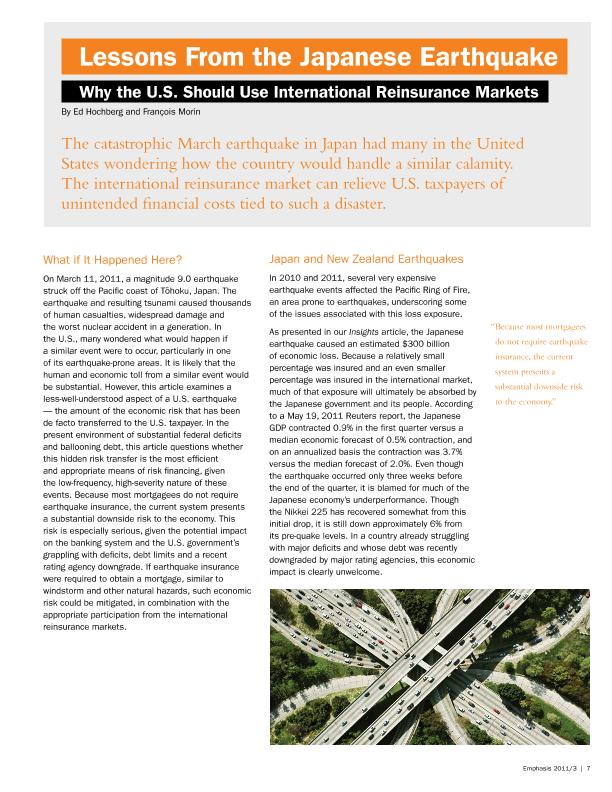Lessons from the Japanese Earthquake: : why the U.S. should use international reinsurance markets

Contenido multimedia no disponible por derechos de autor o por acceso restringido. Contacte con la institución para más información.
| Tag | 1 | 2 | Valor |
|---|---|---|---|
| LDR | 00000cab a2200000 4500 | ||
| 001 | MAP20110058654 | ||
| 003 | MAP | ||
| 005 | 20111006170749.0 | ||
| 008 | 111006e20110930gbr|||p |0|||b|eng d | ||
| 040 | $aMAP$bspa$dMAP | ||
| 084 | $a328.1 | ||
| 100 | $0MAPA20110026486$aHochberg, Ed | ||
| 245 | 0 | 0 | $aLessons from the Japanese Earthquake: $b: why the U.S. should use international reinsurance markets$cby Ed Hochberg and François Morin |
| 520 | $a In the present environment of substantial federal deficits and ballooning debt, this article questions whether this hidden risk transfer is the most efficient and appropriate means of risk financing, given the low-frequency, high-severity nature of these events. Because most mortgagees do not require earthquake insurance, the current system presents a substantial downside risk to the economy. This risk is especially serious, given the potential impact on the banking system and the U.S. government's grappling with deficits, debt limits and a recent rating agency downgrade. If earthquake insurance were required to obtain a mortgage, similar to windstorm and other natural hazards, such economic risk could be mitigated, in combination with the appropriate participation from the international reinsurance markets | ||
| 650 | 1 | $0MAPA20080629755$aSeguro de riesgos extraordinarios | |
| 650 | 1 | $0MAPA20080600204$aCatástrofes naturales | |
| 650 | 1 | $0MAPA20080602529$aMercado de reaseguros | |
| 650 | 1 | $0MAPA20080632168$aTransferencia Alternativa de Riesgos | |
| 650 | 1 | $0MAPA20080621391$aFinanciación de los riesgos | |
| 650 | 1 | $0MAPA20080579814$aCrisis financiera | |
| 651 | 1 | $0MAPA20080638337$aEstados Unidos | |
| 700 | 1 | $0MAPA20090038738$aMorin, François | |
| 773 | 0 | $wMAP20077000932$tEmphasis$dNew York : Towers Watson, 1987-$g30/09/2011 Número 3 - 2011 , p. 7-13 |

